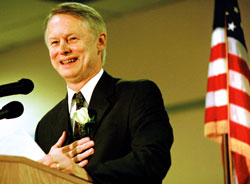As election officials continue to count ballots, a couple of things are clear about Washington’s new partisan primary: A lot more people voted than were expected to, and it still takes forever to tabulate the results. At press time, several candidates waited on tenterhooks for the final outcome, although all results seemed likely to be finalized just in time for the certification deadline Friday, Sept. 24.
In the contest for the Democratic nomination for attorney general, former Seattle City Attorney Mark Sidran conceded to former state Insurance Commissioner Deborah Senn last week. But with each update of the vote count, the race tightened up. On Tuesday, Sept. 21, Senn’s lead had closed to 9,516 votes, or 1.4 percent of the overall ballots cast. An automatic recount would occur if the gap narrowed to one half of 1 percent. The Sidran camp continued to whine that the U.S. Chamber of Commerce’s $500,000’s worth of dirty campaign ads against Senn late in the race backfired and boosted the former insurance commissioner to victory. Balderdash. It is much more reasonable to assume that Senn’s lead was narrowed by the scurrilous hit pieces. Remember, negative advertising works. That’s why people pay to do it.
Perhaps more on people’s minds is why it takes so damn long to get a final ballot count. Mostly, it has to do with the way we vote, say election officials.
Washington is one of only three states in the nation that allows people to vote by mail on a permanent basis (the others being Oregon, where everyone votes by mail, and California), according to Secretary of State Sam Reed. And Reed says we are the only state he knows of that allows mail-in ballots to be postmarked as late as election day. That means ballots continue to arrive at county auditors’ offices for a few days after the election. Both Oregon and California require that ballots be receivedby the auditor on election day, explains Reed.
In the average Washington election, two-thirds of the votes are cast by mail, according to Reed, and this year’s primary election is no different. While it doesn’t take any longer to count mail-in ballots than ballots cast at the polls, says King County Elections Director Dean Logan, it takes much longer to process them.
When a mail-in ballot arrives at a county election office, a worker must verify the signature with the voter’s registration card that is on file. Every single signature is checked, according to Logan. Next, the outer envelope with the signature on the outside is removed, leaving the ballot in its inner “security” envelope. A different worker opens those inner envelopes to protect the privacy of our ballots. Then the ballots are arranged by legislative districts and fed into the counting machines. The process is labor-intensive, and speed is not foremost in election officials’ minds. “The important thing is to do it right, not to do it fast,” says Reed.
There is one big drawback, admits Reed. The slow process of counting ballots can really hurt candidates in primary races. Take the attorney general’s race. In the Republican primary, King County Council member Rob McKenna won the nomination easily over lawyer Mike Vaska. Since things are closer in the Democratic race, the GOP’s McKenna can get a head start in the seven-week sprint to the Nov. 2 general election. “It’s very unfair to the candidates,” says Reed.
His solution? Move the primary to June so there’s plenty of time to count votes and prepare for the general election. Legislation proposed by Reed, which would have moved the primary to June, passed the Democratic controlled state House of Representatives during the past two legislative sessions but stalled in the Senate, which has been controlled by the GOP. The issue isn’t a partisan one, insists Reed, a Republican, but rather that longtime incumbents prefer a September primary because the small number of days between the primary and the general elections makes life harder for potential challengers.
Former state Rep. Laura Ruderman, Reed’s Democratic opponent for Secretary of State, has a different take. She thinks it might not be possible to move the primary to June and preserve the so-called “session freeze” that prohibits lawmakers from raising money during, and immediately before and after, legislative sessions. Conceivably, a long legislative session could prevent candidates from raising money in time for the primary campaign. Reed thinks the session freeze might have to be tweaked but can be largely preserved.
The two also disagree on the reasons for the relatively big turnout in this year’s primary election. At press time, even though not all votes had been counted, turnout was more than 40 percent. Many observers, including Reed, predicted fewer Washingtonians would vote in this year’s new partisan primary, which obligated people to state a party preference. “I’m delighted,” says Reed, who attributed the good turnout to the advertising and outreach spearheaded by his office. Ruderman says Reed didn’t do anything to help matters. “I give credit to the voters for ignoring all the doomsday prophecies,” she says.
Reed might get the last laugh, however. Eighty percent of the voters surveyed on primary election day said they didn’t like the new primary. That’s good news for Initiative 872, on November’s ballot and backed by Reed, which would eliminate the partisan primary in favor of a top-two system in which the two most popular candidates advance to the general election, regardless of partisan affiliation.








